- jmurray01
- New Member
 Offline
Offline 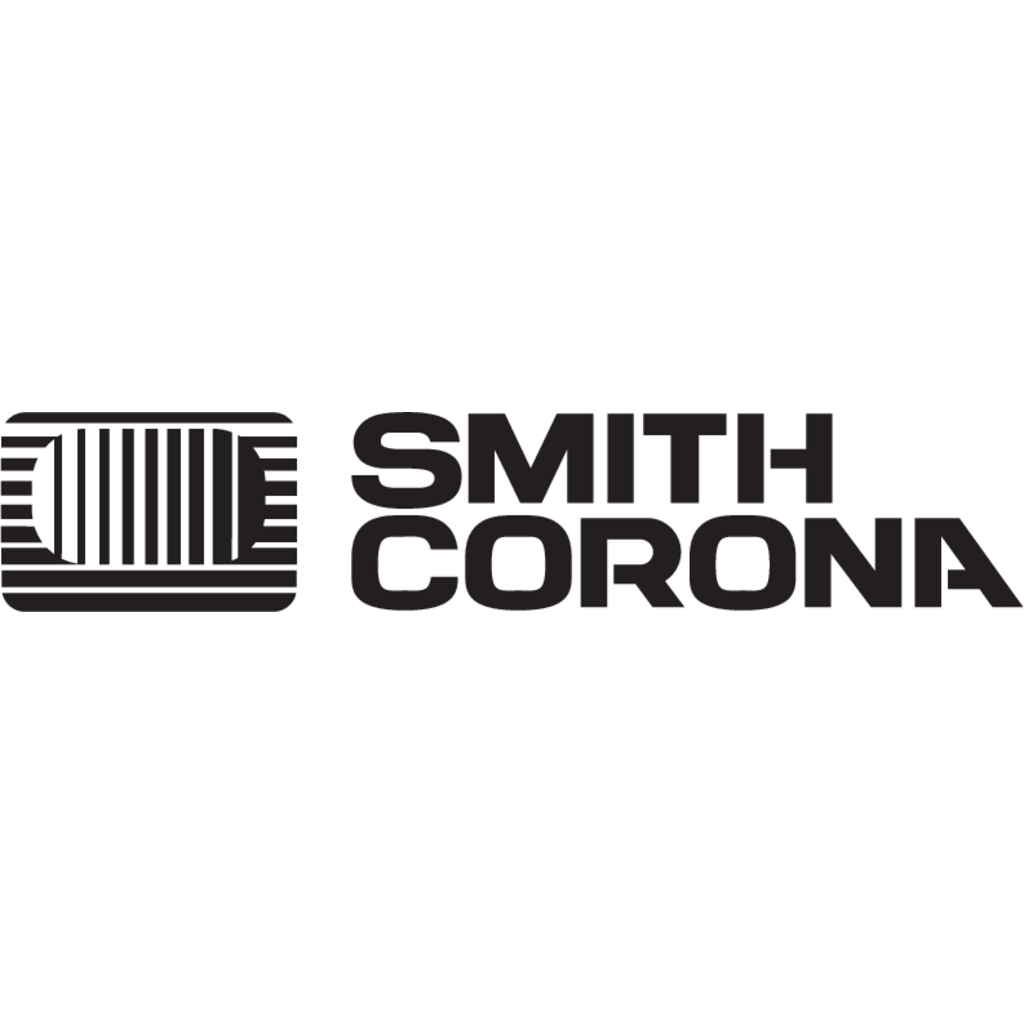
- Registered: 02-8-2015
- Posts: 9
Remington INTERNATIONAL...
This was another one of my Gumtree finds, which I went all the way through to Dundee to pick up. The cost was £10 and all I knew was that it was a typewriter. Not whether it worked or anything.
As it turned out, I got a bargain.
The back-story to it is that it was used in a Dundee law firm's office until the employee to whom it was assigned retired in the 1960s and she got the typewriter as a leaving gift, as they often did back then. It was apparently last used in the 1980s and since then sat with its cover on in the garage, when the woman's sister put it up for sale as she had moved house.
When I got home I put a sheet of paper in and proceeded to test the machine. I expected just to get imprints on the paper as the ribbon had been in situ for over 30 years, but was astounded when I hit a key and it typed as if it had never been out of use! Yes the hammers were terribly stiff (nothing WD-40 couldn't sort out) but the ribbon strangely still had a usable amount of ink. Nevertheless, I replaced it soon thereafter but am still amazed by that, when some (obviously poorer quality) ribbons dry out after a matter of months.
I've still to give the machine a full clean-up, but mechanically it is in full working order and all the keys now operate freely after lubrication and a few hours of typing.
I'm just looking for some information on this model if possible, as my knowledge is still rather limited when it comes to typewriters.
As far as I can see this was not a model designed for home use, but rather solely for an office environment. I like the handle on the top right that rotates the platen (useful for scrolling through documents) and also the fact it has dual caps lock keys (one on the right as well as the left).
With regards to its age, I would say probably late 50s, early 60s - but I could be wrong there.
Let me know what you think!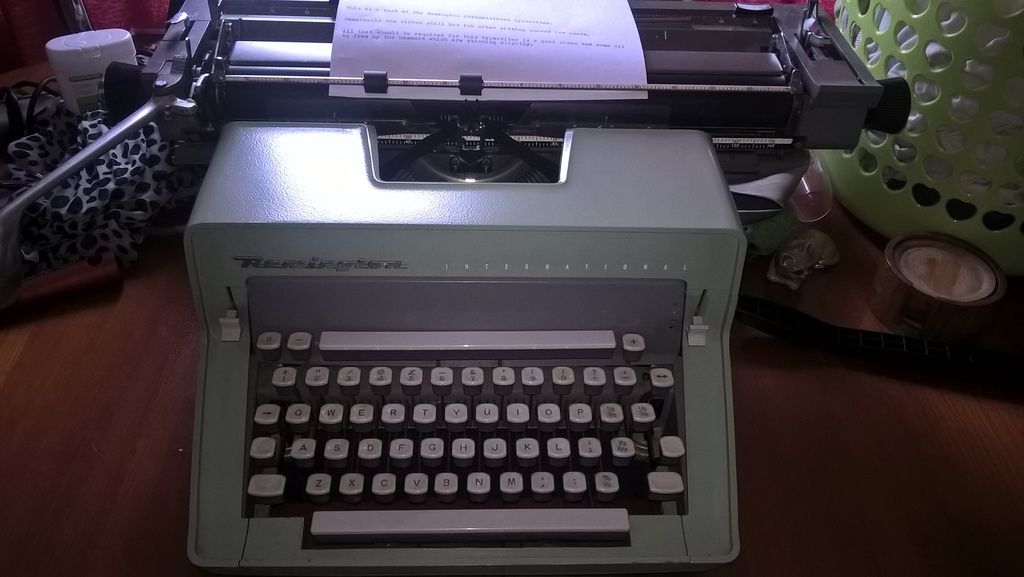
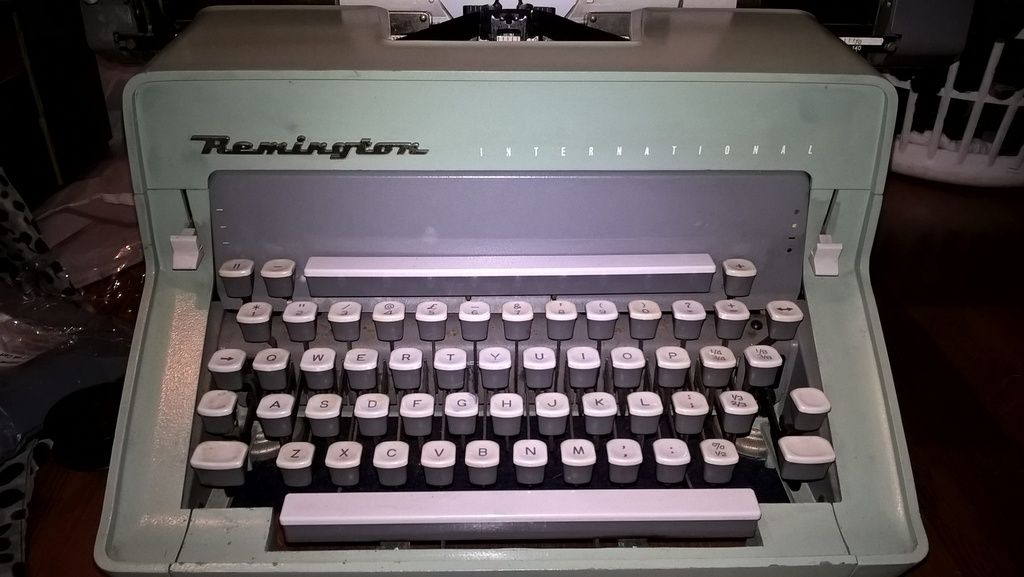
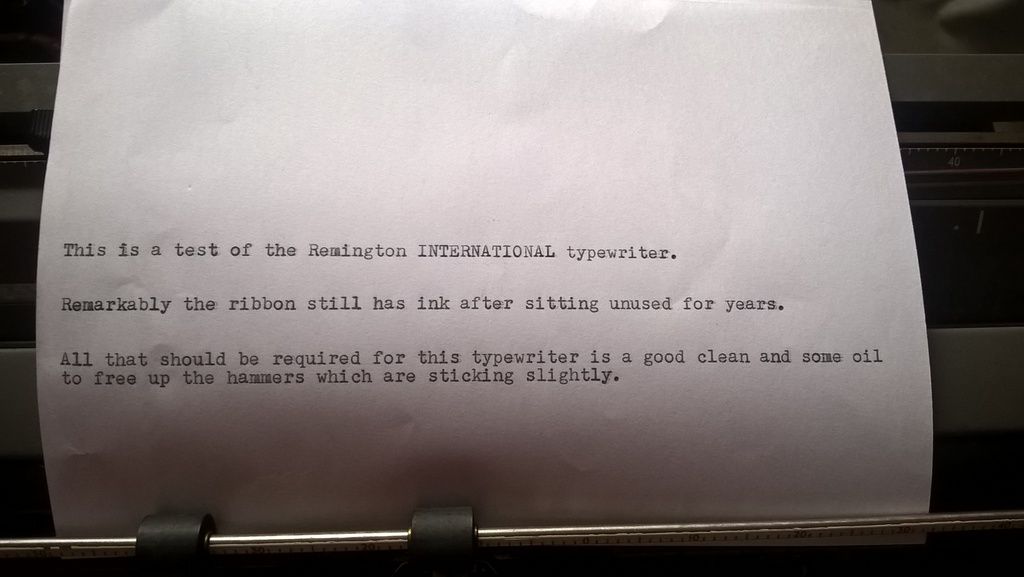
- jmurray01
- New Member
 Offline
Offline 
- Registered: 02-8-2015
- Posts: 9
Re: Remington INTERNATIONAL...
Also, could somebody advise me what this switch is for? The one on the right is for the colour but this doesn't seem to do anything!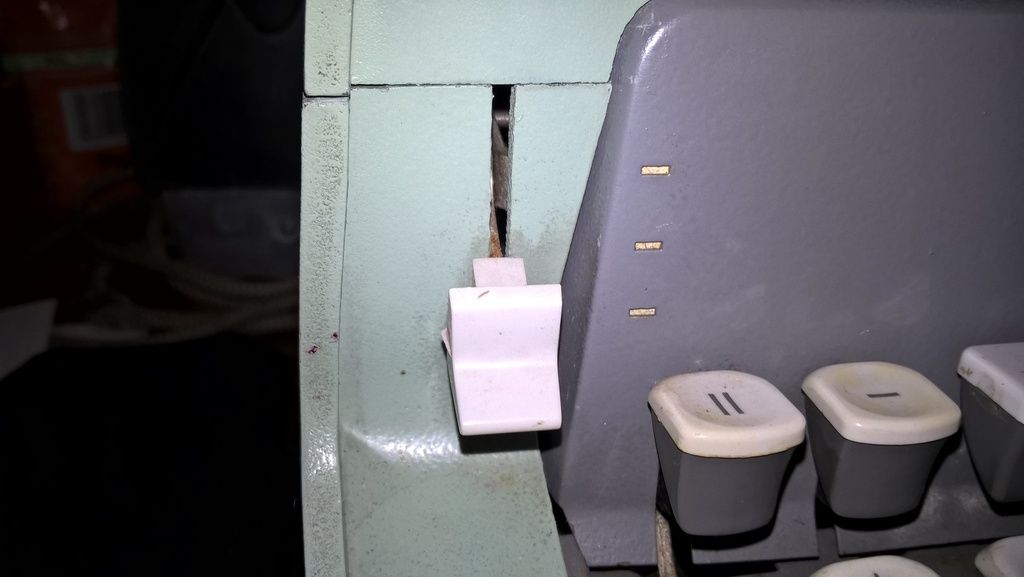
This is a clear picture of the "handle" I referred to before, which you can pull for quickly rotating the platen. Not sure what the benefit of using that would be though, as opposed to just using the knobs on either end of the platen.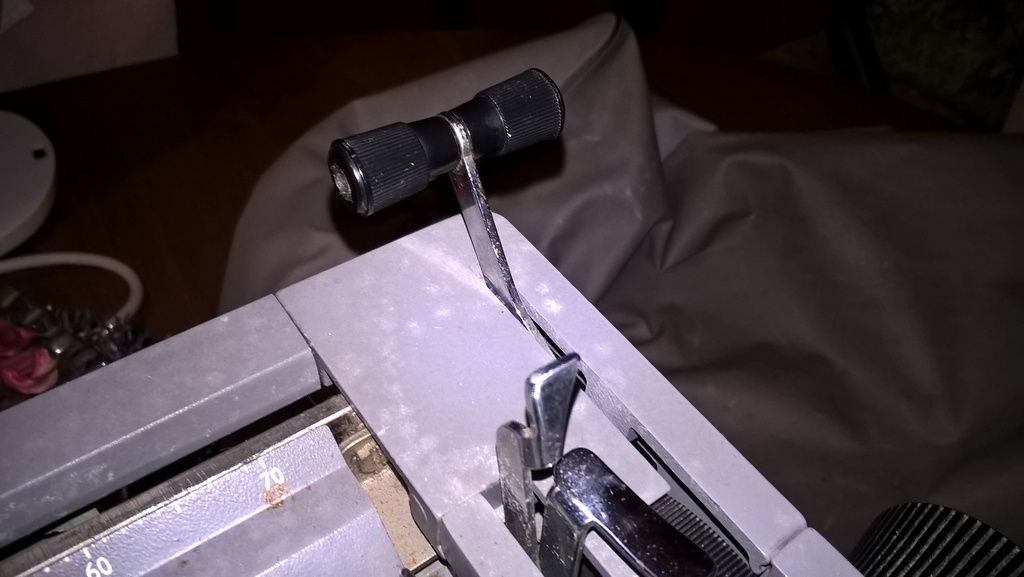
- •
- Uwe
- Moderator
 Offline
Offline 
- From: Toronto, Canada
- Registered: 12-3-2013
- Posts: 4,410
Re: Remington INTERNATIONAL...
The Remington International is a very nice standard, It was produced between 1961 and 1969, but if you want an exact year for your machine you'll need to provide its serial number. If I ever come across one locally I would definitely buy it as it would perfectly compliment the portable version of the design, the Remington 11:
The lever in your last photo is for the paper injector, which quickly loads a new sheet of paper in the machine. I use them all the time and wish every typewriter, well, standard models at least, had one. The other lever in the previous photo is most likely either a touch or imprint control.
WD-40?!? Aside from maybe freeing up a nut or bolt that's rusted in place, you should never use that horrid stuff on a typewriter! The keys should all move freely without ANY lubrication at all. Oil in such a scenario is not a solution, it's just masking a problem. Machines that have been sitting a long time require a deep cleaning, and once all the dirt and surface corrosion has been removed you'll find that the machine will work well without any oil at all. Once it's that clean, and only once it's that clean, do a handful of components receive a very small amount of oil.
The pronoun I has always been capitalized in the English language for more than 700 years.
- thetypewriterman
- Key Master
 Offline
Offline - From: Leiston, England
- Registered: 29-5-2013
- Posts: 946
Re: Remington INTERNATIONAL...
The lever on the left (mirror image of the ribbon control) is a keyboard 'Touch Control'. It puts more or less resistance behind the keys depending on what you feel comfortable with, according to your typing style. WD-40 is positively harmful to typewriters, as Uwe mentions. Don't let it near a typewriter, not even for freeing a siezed mechanism off. Use penetrating oil for that. The trade called this model the GJ, after the first two characters of its serial number, which you will find stamped onto the carriage bed. They are nice typewriters !
- jmurray01
- New Member
 Offline
Offline 
- Registered: 02-8-2015
- Posts: 9
Re: Remington INTERNATIONAL...
Thanks for the information guys! With regards to the WD40, I'll be cleaning the Remington soon so that'll get washed out - but admittedly if I'd had any grease left I'd have used that but was completely out. It does dry out pretty quickly (hence why it is poor for long-term lubrication) so shouldn't be an issue as long as I don't make a habit of it.
- •
- jmurray01
- New Member
 Offline
Offline 
- Registered: 02-8-2015
- Posts: 9
Re: Remington INTERNATIONAL...
Oh, and with regards to the touch control - it must have long-since worn out as I can feel absolutely no difference between any of the three settings.
- •
- Uwe
- Moderator
 Offline
Offline 
- From: Toronto, Canada
- Registered: 12-3-2013
- Posts: 4,410
Re: Remington INTERNATIONAL...
jmurray01 wrote:
...if I'd had any grease left I'd have used that but was completely out. [WD-40] does dry out pretty quickly (hence why it is poor for long-term lubrication) so shouldn't be an issue as long as I don't make a habit of it.
For the sake of your typewriter(s), their longevity, and your continuing enjoyment of them, please read up a little on proper cleaning and lubricating techniques and materials. You'll be glad that you did: Grease and WD-40 have no place in precision machines.
The pronoun I has always been capitalized in the English language for more than 700 years.
- Repartee
- Key Master
 Offline
Offline 
- From: Brooklyn
- Registered: 12-10-2015
- Posts: 683
Re: Remington INTERNATIONAL...
jmurray01 wrote:
Oh, and with regards to the touch control - it must have long-since worn out as I can feel absolutely no difference between any of the three settings.
I hazard a guess that a linkage has disconnected if no effect, since at least on other makes the touch control seems to work by varying spring tension so it could not really wear out. Now that you mention it I have encountered other machines where it did nothing. I don't find much use for this feature even when it works because I don't find spring tension adjusts the "touch" in a usable way - the meat of the touch is about momentum and balance and detailed design of the linkage, and if this doesn't suit I don't find that making springs stiffer or softer improves matters.
But my sincere congratulations on your handsome office machine. It seems to be possible to take your pick of a large number of fine ones from that era right now, as they are not small and cute and neither are they antique-ish enough to satisfy the average person who wants an old typewriter for display. So buy 'em while they are cheap! The moment will pass.
"Damn the torpedoes! Four bells, Captain Drayton".

 1 of 1
1 of 1